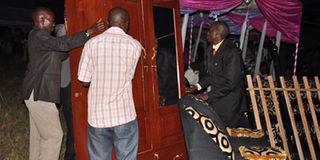Prime
About gifts exchanged at kwanjula

Grooms can also take different pieces of furniture like cupboards for their in-laws. Photos | Shamim J. Nakawooya.
What you need to know:
- What you need to know. Although different tribes across the country have different conditions and traditions when it comes to giving gifts during marriage ceremonies, many of them see the bride and groom’s sides offering gifts to the in-laws, writes Shamin J Nakwooya.
An introduction ceremony commonly known as kwanjula in Buganda (but which term is generally used among most Bantu speakers across the country) basically means to “introduce”. It is the day the bride-to-be introduces her would-be husband.
The bride’s side
Many parents prepare their daughter with the help of the father’s sister, for marriage and the bride usually expects to receive gifts from her parents or family as well as from her in-laws to-be.
In Buganda and Ankole, parents usually prepare different gifts to help their daughter settle in her marriage comfortably. The gifts are also a sign of care and affection towards the bride-to-be.
The bride’s parents may give her gifts such as money, or a plot of land to act as initial capital to help her start a new life. It is also a way of showing their son-in-law that they are a caring and responsible family.
The bride’s parents also usually send gifts to the groom’s parents as a way of thanking their fellow elders for allowing their son to marry from their family.
Significance to the bride
Fred Kibudde, a kwanjula MC, says gifts which the girl receives from the parents are vital in supporting, maintaining and sustaining love between the couple.
“They boost or strengthen the relationship and connection between the bride’s and groom’s families,” he adds.

The suitor also carry a suitcase which has clothes, shoes, jewellery, make-up and hijabs for Muslims among other gifts.
John Baptist Kalema, a teacher of language and linguistics, says in the western or Ankole region, during the kuhingira where the woman is given away, the bride normally receives gifts such as bedding in order to get prepared for marital roles.
In the western part of the country , parents, relatives and friends give many gifts to the bride during the kuhingira, but among the important gifts are what is referred to as omugamba which comprises milk pots, a milk gourd and watering tins among other things. All these symbolise prosperity, food security and maintaining cattle as a cultural norm.
In the past, parents in Buganda used to give gifts such as baskets, a knife, mats, firewood and clothing which were meant to prepare the bride for the kitchen chores.
The senga could openly tell the bride that a good wife must prepare or cook the best meals for the husband and other relatives, using the gifts she received from the parents. Parents used to offer a lamp in the past to provide light at night; nowadays some parents give out out solar panels which symbolise light in marriage.
Currently however, the gifts can reach huge proportions with wealthy parents offering electronics for the kitchen, a washing machine, a full set of furniture and so on. Of course this also signals how well-off the bride’s parents are.
The groom’s side
The groom takes bride price to the bride’s family. It is a sign of appreciation for accepting him into their family. It is also a way of thanking them for looking after his wife to be.

Men can take different pieces of furniture such as beds for their in-laws.
It also symbolises that he will be able to look after their daughter as it shows that he is hardworking.
Bride price is mandatory and what is brought is therefore determined by the parents of the bride.
Other gifts that can be brought include clothes (traditionally it used to be bark cloth), goats, cows, salt and food stuffs. Nowadays, grooms also carry a suitcase which has clothes, shoes, earrings, make-up, underwear, veils and hijabs for Muslims, a watch and perfumes among other gifts. These symbolise what will be in the wife’s wardrobe.
Alternatively...
Before the introduction ceremony, the groom’s parents could also pay a visit to the parents of their daughter-in-law to-be. They would go with gifts to the elders as a sign that they are ready to warmly receive their daughter-in-law to-be when she gets married to their son.
Also, this means that the family she is getting married to is such a loving and responsible one.




